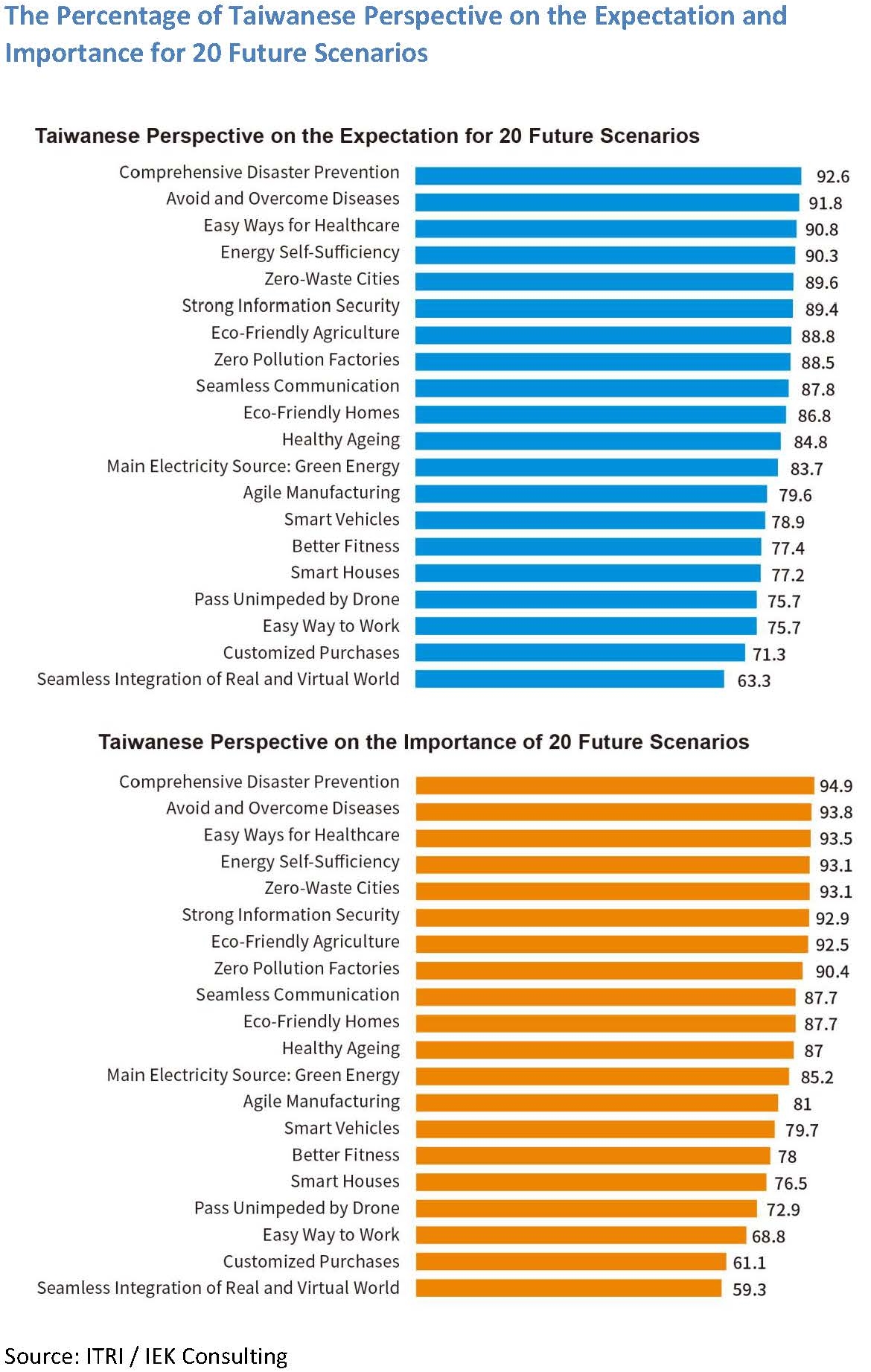ISTI's survey on "Taiwan's Cross-Generational Portrait of Lifestyles in 2035" was conducted to understand Taiwanese people’s expectations for society in 2035. The survey took samples from different genders, age groups, and places of residence in Taiwan and collected 3,191 valid responses.
In the following paragraphs, we share the expectations and thoughts of the Taiwanese public for the 2035 society in four application domains: Resilient Society, Sustainable Environment, Quality Health, and Smart Living.
Resilient Society
Among the scenarios in the Resilient Society, Comprehensive Disaster Prevention( 92.6%) is the most expected among Taiwanese public and is also considered the most important by Taiwanese people (94.9%). Comprehensive Disaster Prevention surpassed other scenarios often discussed by the media and industries, such as Avoid and Overcome Diseases, Zero-waste Cities, Energy Self-sufficiency, and Seamless Integration of Real and Virtual World.
In addition to Comprehensive Disaster Prevention, the public also has high expectations for other resilience scenarios. The local public looks forward to Energy Self-sufficiency (90.3%), Strong Information Security (89.4%), and Agile Manufacturing (79.6%).
Further analysis found that the expectation for Strong Information Security increased with age, with the 60-69 age group exhibiting the highest expectation (92.3%). This indicates that seniors are less confident in their ability to protect information and expect technology to offer additionalsupport in information security. Moreover, 99% of healthcare and social work service industry workers consider Comprehensive Disaster Prevention very important. Future developers of disaster prevention technology systems should connect the technology management systems with healthcare and social work systems appropriately.
Sustainable Environment
For the five Sustainable Environment scenarios proposed in this survey, the responses on expectation for the scenarios are as follows: Zero-waste Cities (89.6%), Eco-friendly Agriculture (88.8%), Zero Pollution Factories (88.5%), Eco-friendly Agriculture (86.8%), and Main Electricity Source from Green Energy (83.7%).
Results show that the sector of green power technology is highly anticipated and considered very important. The proportion of men and women who look forward to Main Electricity Source from Green Energy is 79% and 88%, respectively. Green power technology developers can consider how to leverage women’s social roles and behavioral patterns to speed up green power technology implementations.
Furthermore, a significant 94.6% of respondents in Eastern Taiwan and other regions consider Eco-friendly Agriculture important; however, only 84.6% of them expect it to occur. This may be due to still-existing entry barriers for Eco-friendly Agriculture in the eastern area.
Quality Health
Taiwan entered an aging society in 2018 and is expected to become a superaged society in 2025. As an aging society becomes a significant issue for Taiwan, our employment environment and infrastructure must adapt accordingly.
In Quality Health scenarios, Avoid and Overcome Diseases and Easy Ways for Healthcare rank second and thirdin terms of the public’s expectations, while Healthy Aging and Better Fitness rank 11th and 15th, respectively. This shows that people expect to address problems related to diseases and care, rather than just focusing on aging and physical limitations.
Additionally, we discove r e d that respondents who are married, have children, or have senior family members living with them have higher expectations for scenarios such as Easy Ways for Healthcare, Better Fitness, Avoid and Overcome Diseases, and Healthy Aging. This indicates that people who are caretakers of the family hope that future technology can share their workload.
Smart Living
Smart Living Scenarios in the survey include Seamless Communication, Smart Vehicles, Smart Houses, Pass Unimpeded by Drone, Easy Way to Work, Customized Purchases, and Seamless Integration of Real and Virtual World. Among them, Seamless Communication is the most expected (87.8%) and most important (87.7%).
Among respondents working in the finance and insurance industry, 80% look forward to Customized Purchases and 74% anticipate Seamless Integration of Real and Virtual World, which are both higher than the overall 71% and 63%, respectively. This may be due to that the COVID-19 pandemic has sped up digital transformation in the financial industry in recent years and financial workers have witnessed that smart technology solutions do help improve operational efficiency and customer satisfaction.
In addition, 74% of student respondents and about 66% of education workers look forward to Seamless Integration of Real and Virtual World. This may indicate that teachers find it more challenging than students do when virtual-physicalintegrated
technology is applied in education. Technology developers should be aware of this and assist teachers in overcoming relevant issues to further expand these applications.
In conclusion, the survey shows that the Taiwanese public expects a future free from diseases and natural disasters. If the government or businesses want to roll out technological solutions that have a significant impact on the public, disaster prevention and mitigation, healthcare, and reducing environmental pollution are preferable areas to plan R&D programs or launch products.
The opinions of over 3,000 Taiwanese people reflect their desire for a better future supported by science and technology in 2035. We hope that their perspective can serve as a guide for technology development in ITRI and Taiwan’s industries.


